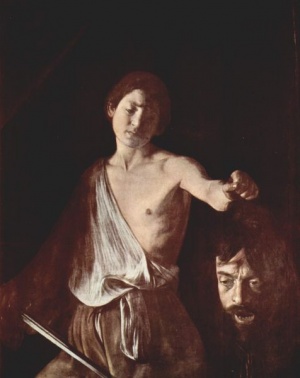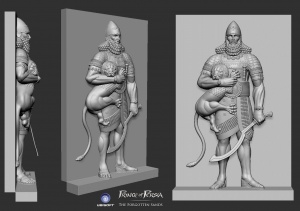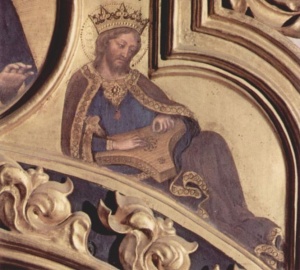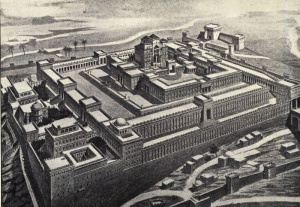David
| Acest articol (sau părți din el) este propus spre traducere din limba engleză!
Dacă doriți să vă asumați acestă traducere (parțial sau integral), anunțați acest lucru pe pagina de discuții a articolului. |
| La acest articol se lucrează chiar în acest moment!
Ca o curtoazie față de persoana care dezvoltă acest articol și pentru a evita conflictele de versiuni din baza de date a sistemului, evitați să îl editați până la dispariția etichetei. În cazul în care considerați că este necesar, vă recomandăm să contactați editorul prin pagina de discuții a articolului. |

Sfântul şi dreptul rege David a fost cel de-al doilea rege al Israelului biblic, urmându-i regelui Saul şi a trăit şi domnit cu aproximativ 1000 de ani înainte de naşterea Domnului nostru Iisus Hristos (1000 î.Hr.). El a fost de asemenea unul din proorocii Vechiului Testament, autorul Psalmilor şi unul dintre strămoşii Domnului nostru Iisus Hristos. Pomenirea sa se săvârşeşte în Duminica Sfinţilor Părinţi după trup ai Domnului (11-18 decembrie), precum şi în prima duminică după Naşterea Domnului, împreună cu pomenirea Sfântului şi dreptului Iosif şi a Sfântului Apostol Iacov, ruda Domnului.
Cuprins
Viaţa şi faptele
Descrierea completă a vieţii Regelui David se găseşte cuprinsă în Vechiul Testament începând în Cartea Întâi a Regilor (capitolul al 16-lea), continuând pe întreaga întindere a Cărţii a doua Regilor şi încheindu-se în Cartea a treia a Regilor (capitolele 1-2). O versiune puţin diferită a acestei narări, incluzând şi aspecte specifice cu privire la conducerea regatului, se regăseşte în Cartea întâi a Cronicilor, în special la începutul capitolului al 11-lea.
Tinereţea
David s-a născut în cetatea Betleem, fiind cel de-al optulea şi totodată cel din urmă fiu al lui Iesei. După ce regele Saul s-a îndepărtat de Dumnezeu (I Regi, 15), Domnul i-a poruncit proorocului Samuel să meargă la Betleem, în casa lui Iesei, şi să ungă drept rege al Israelului pe fiul acestuia. Fiind cel mai mic şi foarte tânăr, David n-a fost chemat de părintele său atunci când Samuel i-a cerut să-i arate pe fiii săi, ci a fost lăsat să pască turmele de oi. Dumnezeu însă i-a descoperit lui Samuel că nici unul din cei şapte fii prezentaţi de Iesei nu este cel ales de El, astfel încât sfântul a cerut să afle dacă aceştia sunt toţi fiii lui Iesei. Atunci a fost chemat şi David, iar Dumnezeu i-a descoperit lui Samuel ca pe acesta să-l ungă drept rege al Israelului în locului lui Saul. Un verset memorabil din această carte este cel care descoperă cât de diferită este judecata omenească de cea a lui Dumnezeu: Dar Domnul a zis către Samuel: "Nu te uita la înfăţişarea lui şi la înălţimea staturii lui; Eu nu Mă uit ca omul; căci omul se uită la faţă, iar Domnul se uită la inimă". (I Regi, 16)
Devenit Alesul, Unsul lui Dumnezeu la această vârstă fragedă, David va fi trimis de tatăl său a face o vizită la curtea regelui Saul, care abandonându-L pe Dumnezeu se afla chinuit de demoni. David era deja un foarte priceput cântăreţ la harpă, iar Saul apreciind cântarea aceastuia care îi odihnea sufletul, l-a oprit la curtea sa, numindu-l ca scutier al său. David se împrieteneşte repede cu fiul lui Saul, Ionatan.
La puţin timp după aceasta, israelitenii au avut de purtat un nou război împotriva filistenilor, iar trei dintre fraţii mai mari ai lui David se aflau în oastea condusă de regele Saul, aşteptând începutul luptelor. Iesei, tatăl lor, dorind să afle veşti despre fiii săi, l-a trimis pe David cu provizii către aceştia. Între timp, Goliat din Gat, un războinic filistean uriaş (măsura peste 2 metri - şase coţi şi o palmă) ieşind din tabăra sa pe locul lăsat liber între cele două armate, cerea să-i fie trimis un războinic israelitean astfel încât rezultatul luptei dintre ei să decidă care parte va câştiga războiul. Şi a făcut Goliat astfel timp de 40 de zile, umilindu-i pe israeliteni pentru laşitatea lor. Ajuns în tabăra, alături de fraţii săi, David a aflat de această batjocorire adusă neamului său şi se hotărăşte să spele ruşinea israelitenilor, punându-şi nădejdea mai degrabă în ajutorul lui Dumnezeu, decât în arme şi armuri. Cu voia şi binecuvântarea regelui Saul, David porneşte să-l înfrunte pe Goliat înveşmântat doar cu straiele sale de păstor şi înarmat doar cu o praştie şi câteva pietricele. Văzându-l pe David, tânăr, neexperimentat şi neînarmat, Goliat se pregăti de atac, însă căzu ucis de o mica pietricică expediată de David cu ajutorul praştiei sale. David apoi a alergat şi luându-i uriaşului armele îi tăie capul, iar filistenii văzundu-şi campionul înfrânt, s-au înspăimântat şi au fugit din calea israeliţilor.
Fuga de Saul
Curând popularitatea lui David în mijlocul poporului a crescut ; obişnuita frază « Saul o omorât mii, dar David a omorât zeci de mii » prin care se subînțelegea că David era un războinic mai bun, a început să-l obsedeze pe Saul devenind din ce în ce mai gelos. De două ori, în timp ce David cânta la harpa pentru Saul, acesta a încercat să-l ucidă ; după a doua tentativă, David a fugit pe un câmp unde s-a întâlnit cu prietenul său drag, Ionatan, fiul lui Saul. Împreună au pus la cale un plan prin care să afle intenţiile lui Saul în privinţa lui David, şi au stabilit un semnal discret pe care Ionatan să-l dea lui David. Când mânia lui Saul s-a dezlănţuit la vestea că David s-ar fi întors acasă în Betleem, Ionatan a înţeles că tatăl său intenţiona să-l omoare pe David şi i-a spus acest lucru. Aşa a început lungul exil al lui David. David a fugit de Saul la Nob în Israel unde a fost ajutat de către marele preot. Apoi a mers în statele vecine ale lui Gath si Moab, înainte să se întoarcă în Iudeea. Între timp, Saul a ucis pe preotul din Nob şi pe aproape toţi fii lui pentru că l-au ajutat pe David. În acelaşi timp, David strânsese o mică armată cu el şi singurul fiu al preotului din Nob, ce mai rămăsese în viaţă, a venit şi i s-a alăturat. Sub călăuzirea lui Dumnezeu, oamenii lui David au mers şi au înfrânt o tabără de Filisteni în oraşul Keilah.
David a aflat că Saul se îndrepta spre Keilah ca să-l omoare şi astfel a scăpat. David a cruţat de două ori viaţa lui Saul, nevrând să pună mâna sa pe Unsul Domnului. David şi oamenii săi au continuat să-şi îmbunătăţească îndemânările în arta luptei în timp ce fugeau de Saul ; s-au întors din nou pe teritoriul Filistenilor (Gath) unde au fost protejați de către rege timp de un an şi patru luni. Când Filistenii erau pe punctul de a-i înfrânge pe israeliţi, l-au alungat pe David întrucât le era teamă de supunerea lui faţă de ei. Aşa că a mers în schimb să se lupte cu amaleciții, un trib care tocmai prădase părţi din pământul filistenilor şi din cel al lui Iuda ; această victorie a fost un mare succes pentru David.
În schimb, în ceea ce-l priveşte pe Saul lucrurile nu mergeau deloc bine pentru el. Într-una din luptele cu filistenii, trei dintre fii săi au fost omorâți, iar Saul a fost înconjurat şi rănit grav. A sfârşit prin a se sinucide aruncându-se în propria sa sabie. Când David a aflat vestea, a plâns cu amar sfârşitul vieţii lor, în special cea a prietenului său Ionatan. Apoi David a poruncit să fie executat un amalecit pe care Saul l-a rugat să-l omoare, căci acesta se atinsese de Unsul Domnului.
Regele David
Aşa că David a urcat în Hebron în Iudeea unde a fost uns ca rege. Totuşi, încă nu era conducătorul lui Israel , întrucât Abner, fiul lui Ner şi comandantul armatei lui Saul, l-a pus pe tron pe un alt fiu al lui Saul, divizând astfel Iraelul. Dușmănia între casa lui Saul şi casa lui David a ţinut şapte ani. În timp, casa David devenea din ce în ce mai puternică, pe când cea a lui Saul slăbea. În cele din urmă, Abner a venit la David oferindu-i întregul regat al lui Israel, iar David a fost de acord cu condiţia ca prima lui soţie, Michal, fiica lui Saul (care se recăsătorise), să se întoarcă înapoi la el.
Apoi conducătorii tuturor taberelor lui Israel s-au adunat cu toţii la Hebron ungându-l pe David rege peste Israel. David avea la acea vreme 30 de ani şi condusese Iudeea şapte ani ; a continuat să conducă peste întregul Israel încă treizeci şi trei de ani.
Mai apoi David a ocupat Ierusalimul care era controlat de către Iebuşiţi şi şi-a stabilit capitala acolo. De atunci ea va fi cunoscută sub numele de “Cetatea lui David”. David a decis ca Chivotul să fie adus la Ierusalim; când unul dintre trimiși, Uza, a fost trăsnit de Dumnezeu când a atins Chivotul încercând să-l sprijine, David s-a răzgândit şi l-a aşezat în casa unui om lângă oraş.
În cele din urmă, văzând că prosperitatea casei acelui om a început să crească, David a adus Chivotul la Ierusalim cu mare alai. Văzând splendoarea propriului său palat, iar chivotul protejat numai de un cort, Regele David a vrut să construiască un templu în care să aşeze Chivotul. Dar profetul Natan a venit la David şi l-a înştiinţat despre o descoperire pe care a primit-o de la Domnul, spunând că nu David era cel ales ca să-i construiască Templul, ci unul dintre fii săi.
De-a lungul întregii lui domnii, David a ieşit în mod impresionant victorios din încleştări militare: “Domnul i-a dăruit lui David victoria oriunde se ducea.” I-a înfrânt pe filisteni cucerind cetatea Gat, ca şi pe Edomiteni, Moabiti, Aramati, Hadadezer, regele ţinutului Zobah, şi pe alte triburi ale căror nume nu le mai ştie nimeni astăzi.
David's family
At least eight of David's wives are named in Holy Scripture. The first, Michal, Saul's daughter, is noted for scorning David’s prophetic dance upon receiving the Ark of the Covenant; this is why she was said to be barren. The second, Abigail, had lived with her husband Nabal in Carmel when David came through in his flight from Saul. While Nabal refused any aid, Nabal secretly interceded, bringing David many supplies. Afterwards, when Abigail told her husband of the help she had given David, he dropped dead from (seemingly) a heart attack, leaving Abigail free to marry David. The other wives listed (see 1 Chr 3) were Maacha, daughter of Talmai king of Geshur; Haggith; Abital; Eglah; and Bathsheba, mother of Solomon. He also took "more wives" in Jerusalem. In all, 1 Chronicles lists by name nineteen sons of David.
Several episodes in David’s family life are noteworthy. The first is the famous affair with Bathsheba, one of the few happenings that shows any weakness in King David. One evening the King began to walk around the rooftop of his palace, which overlooked the surrounding city. He saw below him a beautiful woman taking a bath and was seized with lust. He summoned the woman, Bathsheba, to his palace and slept with her. Unfortunately, Bathsheba conceived a child because of this encounter, and her husband Uriah the Hittite had been away on the spring military campaign for some time, making it impossible to claim he was the father. So she sent a message to King David, who immediately called Uriah back to Jerusalem, hoping that he would sleep with his wife. Uriah, however, refused to enter his home, sleeping outside on the steps, out of solidarity with his fellow soldiers camped in tents far from home. The next day David tried to get him drunk and have him go to his house, but this failed as well. So David panicked and sent Uriah back to his commander with an order to put him on the front lines and then withdraw from him, effectively having him killed. Uriah the Hittite then died in battle, and David married Bathsheba. The Lord would not let the affair go unpunished, though, and sent the Prophet Nathan to David to rebuke him, finally telling David that the child would die. David mourned for his son, spending seven days fasting, weeping, and entreating the Lord for the life of his son, but the child died after this time. Solomon, the future king, was born to David and Bathsheba following the death of their first son.
The next family drama involves Amnon, one of David’s sons, and Tamar, sister of Absalom (another of David's sons). Amnon fell in love with Tamar, but Tamar was a virgin and refused to have Amnon. Thus Amnon devised a scheme, pretending to be sick and requesting that only Tamar come to his bed and make him food. After he had ordered everyone to leave, Amnon overpowered the resistant Tamar and raped her. Afterwards she pleaded with Amnon to at least marry her and take away her shame, but Amnon sent her away. She went to live in her brother Absalom’s house, despairing her remaining days. Absalom harbored a terrible grudge against Amnon ever after, and two years following the rape he gathered a banquet to which he invited all the king’s sons. Then he killed his brother Amnon.
Absalom continued to cause further trouble after this. Despite the fact that several years later David summoned his son back to Jerusalem and eventually forgave him, after a few more years Absalom rose in popularity amongst the people. He then told David he wished to go to Hebron and worship, but while away he sent messages to all the tribes of Israel, fomenting a revolt to take the throne for himself. David was finally forced to flee Jerusalem because of the uprising, and Absalom claimed his father's palace and all his concubines. But David had an advisor loyal to him claim to defect to Absalom, and this advisor gave advice that defeated Absalom. David sent specific orders to all his men to only capture Absalom and bring him back unharmed; however, when Absalom got stuck in some low-hanging tree branches riding his horse, David's military commander Joab (who liked to take matters into his own hands and kill people) drove three javelins into Absalom’s heart while he was still hanging from an oak tree. David mourned bitterly for his son, after which he returned to Jerusalem.
Finally, when David was on his deathbed, another son, Adonijah, conspired with Joab to have himself made king. Bathsheba and the Prophet Nathan counterconspired, though, pleading with David to make Solomon king and informing him of the rebellion of Adonijah. So David had Solomon anointed King of Israel. Adonijah accepted this, with the condition that he be given David’s bedside nurse Abishag as a wife.After several more episodes of turmoil, David called Solomon to his deathbed and gave him advice on how to rule the kingdom. He died at the age of sixty-three and was buried in his city, Jerusalem.
David's legacy
As a type of Christ and model king
King David prefigures our Lord Jesus Christ in numerous ways. He was the Lord's Anointed One, or Messiah, a now title applied almost exclusively to Christ. Also, David was a shepherd before he was called to be king; likewise, Christ used herding imagery often in his earthly ministry, as in the Parables of the Good Shepherd, of the Lost Sheep, and of the separation of the sheep and the goats at the Last Judgment. When David was fleeing from Saul, he was an illustration of the Suffering Servant, most famously described in Isaiah 53; afterwards, though, he became the victorious king, gaining control over all Israel and defeating its enemies with ease. David’s story is mirrored by Christ's persecution by the Jews and Crucifixion, followed by his glorious Resurrection and his eventual Second Coming. David's humble origins and the fact that he was the least imposing son of Jesse when Samuel anointed him also parallel Christ's humble earthly status.
Furthermore, David consistently relied on the Lord and thus served as a model king. The Scripture accounts regarding David go out of their way to show his sense of fairness and justice. For example, David rewards all of his men equally, even those too exhausted to continue the chase, after his great victory over the Amakelites (1 Sam 30:23). This episode may be seen as reminiscent of Christ's Parable of the Workers in the Vineyard (Matthew 20). He refused to ever touch his adversary King Saul, was furious about the rape of Tamar, and lamented the death of his rebellious son Absalom, whom he had ordered that no one injure, etc.
As forefather of Christ
The concept of the Davidic line (i.e. that the ruler of Israel be directly related to David) became extremely important in Jewish history ever after David. Much of the reason for this can be seen in God's "Promise to David":
- ...I will raise up your offspring to succeed you, who will come from your own body, and I will establish his kingdom. He is the one who will build a house for my Name....I will be his father, and he will be my son…Your house and your kingdom will endure forever before me; your throne will be established forever.1
(2 Sam 7:12-16)
On the surface, this passage refers to Solomon, David's son, but it may also be extended to Christ. Christ was related to David through Joseph the Betrothed, who was of the Davidic line.
As musician: The Psalms
Besides his role as Saul's harpist, David composed a large number of the Psalms; whether every single one was written by the king is uncertain. Most of the psalms are prefaced by a few words in both the Septuagint and Masoretic texts, and 73 of the 150 (or 151, if the one deuterocanonical psalm is included) explicitly name David as their author. Other introductions give even more detail. For example, Psalm 51 (50 in the Septuagint), our most famous psalm of repentance, is said to have been written by David after Nathan confronted him about his affair with Bathsheba. In any case, David’s contribution to church music and liturgics cannot be ignored, as the Psalms figure prominently in Orthodox worship.
As Temple-planner
Although the Lord would not allow David himself to construct the First Temple in Jerusalem, he set aside much gold and finery from his spoils of war to be used in it. He bought the sight of the future Temple, where he built only an altar. According to 1 Chr 28, David himself wrote out the plans for the Temple, which he gave to Solomon, and also arranged the priests who would serve there into divisions, as well as designating numerous weights and measures important in the Temple’s function.
Solomon, David's son, completed and dedicated the Temple after his father's death. It stood until approximately 586 B.C., when Nebuchadnezzar and the Babylonians captured Jerusalem.
External links
- OCA:Lives of the Saints (search for Dec 17 for the Feast of the Forefathers and Dec 31 for David, Joseph the Betrothed, and James the Just)
- Introduction to I Chronicles: King David
- wikipedia:David
- wikipedia: Temple in Jerusalem
- Come and see icons: Listings for David (Great icons of King David.)
- The Prophecies of King David
- King David
- Format:Note Scripture taken from the HOLY BIBLE, NEW INTERNATIONAL VERSION®. Copyright © 1973, 1978, 1984 International Bible Society. Used by permission of Zondervan. All rights reserved.
Categorii > Istoria Bisericii
Categorii > Liturgică > Sărbători > Sfinți
Categorii > Liturgică > Sărbători > Sfinți
Categorii > Liturgică > Sărbători > Sfinți
Categorii > Liturgică > Sărbători > Sfinți > Sfinți pre-niceeni > Sfinți biblici
Categorii > Liturgică > Sărbători > Sfinți > Sfinți pre-niceeni > Sfinți biblici
Categorii > Oameni
Categorii > Oameni
Categorii > Oameni
Categorii > Oameni
Categorii > Oameni
Categorii > Oameni > Împărați și regi
Categorii > Texte > Sfânta Scriptură > Vechiul Testament
Categorii > Texte > Sfânta Scriptură > Vechiul Testament > Prooroci



